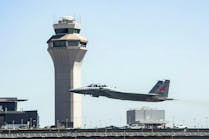Jun. 13—SINGAPORE(Straits Times/ANN) — United States Defence Secretary Lloyd Austin sharply criticised China's "more coercive and aggressive" approach to its territorial claims in the Indo-Pacific in his first speech at the Shangri-La Dialogue on Saturday (June 11).
He promised to reinforce Washington's partnerships in Asia even as he warned that the Ukraine war was a preview of turmoil that could follow if an international order rooted in rules and respect was flouted.
Addressing an audience of defence ministers and top officials from Asia and Europe, Mr Austin also stressed Asean's centrality in tackling security issues and referenced Singapore Prime Minister Lee Hsien Loong's long-held stance that Asean nations must not feel the pressure to choose between the US and China as the rivalry between them heats up.
The US would stay inclusive in its approach, expand cooperation with allies and partners, and work in tandem with new and existing regional institutions, he said.
"We seek inclusion, not division. We seek cooperation, not strife. And that means we're following the wise counsel from Prime Minister Lee, who argues that nobody should force binary choices on the region. He's right. Our fellow Indo-Pacific nations should be free to choose, free to prosper and free to chart their own course."
His hour-long speech contained several forceful criticisms of China, referring to it by its formal name People's Republic of China (PRC). It drew a pointed rebuttal from China.
He spotlighted its actions in the East China Sea, where it has a territorial dispute with Japan; the South China Sea, where its maritime claims clash with several Asean nations including the Philippines, Vietnam, Indonesia, Malaysia and Brunei; and India where tens of thousands of armed troops from both nations are in stalemate across an unmarked Himalayan border.
"In the East China Sea, the PRC's expanding fishing fleet is sparking tensions with its neighbours.
"In the South China Sea, the PRC is using outposts on man-made islands bristling with advanced weaponry to advance its illegal maritime claims.
"We're seeing PRC vessels plunder the region's provisions, operating illegally within the territorial waters of other Indo-Pacific countries.
"And further to the west, we're seeing Beijing continue to harden its position along the border that it shares with India.
"Indo-Pacific countries shouldn't face political intimidation, economic coercion, or harassment by maritime militias," he added.
Promising to maintain an active presence across the Indo-Pacific, he said the US will support the 2016 Arbitral Tribunal ruling which weighed in favour of the Philippines to rule that major elements of China's claim, including its nine-dash line and land reclamation activities in Philippine waters, were unlawful.
"We will fly, sail, and operate wherever international law allows," he added.
"We've seen an alarming increase in the number of unsafe aerial intercepts and confrontations at sea by PLA (People's Liberation Army) aircraft and vessels," he said, referring to an incident in February when a PLA Navy ship allegedly directed a laser at an Australian P-8 maritime patrol aircraft and to incidents of Chinese fighter jets conducting intercepts of aircraft in the East China and the South China seas.
Some of his most pointed remarks were on Taiwan, which was also a divisive subject during his first face-to-face meeting with the Chinese Defence Minister Wei Fenghe in Singapore on Friday.
China sees Taiwan as a breakaway province and wants to reunify with it, by force if necessary. The US, under its Taiwan Relations Act, is obligated to provide the self-ruled island with the weapons and services to defend itself and maintain the capacity to resist any use of force against the island.
"The stakes are especially stark in the Taiwan Strait," Mr Austin said, asserting that US policy was unchanged and would oppose any unilateral changes to the status quo from either side.
"We do not support Taiwan independence. And we stand firmly behind the principle that cross-strait differences must be resolved by peaceful means."
"Our policy hasn't changed. But unfortunately, that doesn't seem to be true for the PRC... we're seeing growing coercion from Beijing. We've witnessed a steady increase in provocative and destabilising military activity near Taiwan. That includes PLA aircraft flying near Taiwan in record numbers in recent months — and on a nearly daily basis."
"The PRC's moves threaten to undermine security, stability and prosperity in the Indo-Pacific. That's crucial for this region, and it's crucial for the wider world."
He also addressed criticism from Beijing that the US was creating an Asian Nato in its quadrilateral grouping (Quad) that includes Japan, India and Australia.
"We do not seek confrontation or conflict. And we do not seek a new Cold War, an Asian Nato, or a region split into hostile blocs," he said.
The US was vested in creating "guard rails" to avoid potentially serious clashes in the Indo-Pacific, he added.
"We're working closely with both our competitors and our friends to strengthen the guard rails against conflict. That includes fully open lines of communication with China's defence leaders to ensure that we can avoid any miscalculations."
China hit back at Mr Austin's speech, saying it was full of "unfounded accusations".
"We express our strongest dissatisfaction and firm opposition," Lieutenant General Zhang Zhenzhong, the deputy chief of the Joint Staff Department in the Central Military Commission, told reporters at a media briefing in Singapore.
"The US claims its Indo-Pacific strategy will promote freedom, openness and prosperity in the region. But its true intention is to use the strategy to maintain its hegemonic system.
"The strategy will cause division. The US is trying to form a small circle in the Asia-Pacific region by roping in some countries to its side. This will inevitably drag the Asia-Pacific region into the track of geopolitical rivalry and bloc confrontation, severely damaging regional cooperation architecture based on Asian centrality."
He warned that Taiwan was an issue that will most easily lead the US and China into conflict, adding that the supply of US arms to the island sent the "wrong signals to Taiwan secessionist and independence forces".
He also noted that the US has been consolidating bilateral military alliances and building up the Aukus trilateral security partnership, the Quadrilateral Security Dialogue (Quad) and the Five Eyes intelligence-sharing alliance.
"What should we call this, other than confrontation? Having created chaos in the Middle East and brought instability to Europe, is the US trying to destabilise the Asia-Pacific?"
He called the US the main instigator of militarisation of the South China Sea, referring to its military exercises and freedom of navigation operations.
On Sunday, the concluding day of the Shangri-La Dialogue, General Wei will present China's vision for peace and stability in the Asia-Pacific.
Big powers carry big responsibilities and should be models of transparency and communication, Mr Austin added.
Drawing parallels with the Ukraine war, he said Russian President Vladimir Putin's reckless war of choice was a reminder of the dangers of undercutting an international order rooted in rules and respect.
"I am here because the rules-based international order matters just as much in the Indo-Pacific as it does in Europe," he said.
" Russia's invasion of Ukraine is what happens when oppressors trample the rules that protect us all. It's what happens when big powers decide that their imperial appetites matter more than the rights of their peaceful neighbours. And it's a preview of a possible world of chaos and turmoil that none of us would want to live in."
___
(c)2022 the Asia News Network (Hamburg, Germany)
Visit the Asia News Network (Hamburg, Germany) at www.asianewsnet.net/home/
Distributed by Tribune Content Agency, LLC.


